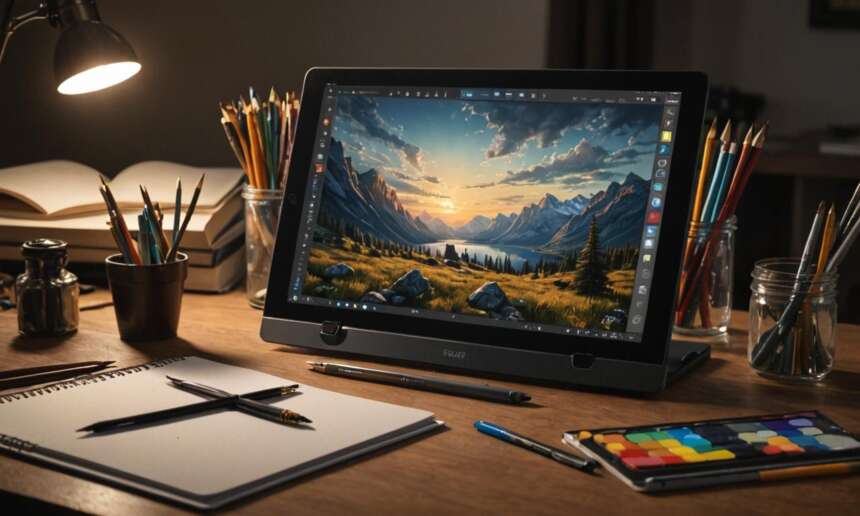Becoming a concept artist requires a blend of creativity, technical skill, and dedication. In this guide, we will explore the essential steps and strategies to help you embark on this exciting career path.
Develop Your Artistic Skills
First and foremost, hone your artistic abilities. Practice drawing, painting, and digital art regularly to improve your skills. Experiment with different mediums and techniques to expand your repertoire.
Explore Various Art Styles
Study different art styles, such as realism, abstract, and stylized art. Understanding various styles will help you develop your own unique visual language as a concept artist.
Master Digital Tools
Concept art often involves digital tools such as Adobe Photoshop, Illustrator, and 3D software like Blender or ZBrush. Familiarize yourself with these tools and learn how to use them effectively.
Study Fundamentals of Design
Concept art is not just about drawing; it’s also about effective design. Learn the fundamentals of design theory, including composition, color theory, and perspective. These principles will enhance the quality of your artwork.
Take Art Classes or Workshops
Consider enrolling in art classes or workshops focused on design fundamentals. These structured learning environments can provide valuable guidance and feedback from experienced instructors.
Study Anatomy and Life Drawing
Understanding anatomy is crucial for creating believable characters and creatures. Practice life drawing to improve your grasp of human and animal anatomy, which will enrich your concept art.
Build a Strong Portfolio
Your portfolio is your calling card as a concept artist. Compile a diverse collection of your best artwork that showcases your skills and versatility. Include a variety of subjects, styles, and mediums to demonstrate your range.
Create Personal Projects
Develop personal projects that reflect your interests and strengths as an artist. These projects not only showcase your creativity but also demonstrate your ability to work independently.
Seek Feedback and Iterate
Don’t be afraid to seek feedback on your portfolio from peers, mentors, or online communities. Use constructive criticism to refine your work and make improvements.
Network and Collaborate
Networking is essential in the art industry. Connect with fellow artists, industry professionals, and potential clients through social media, art forums, and networking events.
Attend Conventions and Workshops
Participate in art conventions, workshops, and industry events to meet like-minded individuals and expand your professional network. These events also offer opportunities to learn from seasoned artists and industry insiders.
Collaborate on Projects
Collaborating with other artists on creative projects can provide valuable experience and exposure. Look for opportunities to collaborate on indie games, films, or art exhibitions.
Stay Inspired and Keep Learning
Concept art is a dynamic field that requires continuous learning and adaptation. Stay inspired by exploring different art forms, watching films, reading books, and immersing yourself in creative environments.
Follow Industry Trends
Stay informed about current trends and developments in the entertainment and gaming industries. Being aware of industry trends will help you tailor your portfolio and skillset to meet market demands.
Never Stop Practicing
Lastly, never stop practicing and refining your craft. The more you practice, the better you’ll become as a concept artist. Embrace challenges, push your boundaries, and strive for excellence.
Frequently Asked Questions
Here are some commonly asked questions about becoming a concept artist:
| Question | Answer |
|---|---|
| 1. Is formal education necessary to become a concept artist? | Formal education can be beneficial but is not always necessary. Many successful concept artists are self-taught or have learned through online resources and workshops. However, pursuing a degree in art or a related field can provide structured learning and opportunities for networking. |
| 2. How important is it to specialize in a particular style or niche? | While having a distinct style or niche can help you stand out in the industry, versatility is also valued. Being able to adapt to different projects and styles can increase your opportunities for work. It’s beneficial to have a strong foundation in various art styles and techniques while also developing your unique voice as an artist. |
| 3. What software tools are essential for concept artists? | Concept artists often use digital tools such as Adobe Photoshop, Illustrator, and 3D software like Blender or ZBrush. These tools allow for flexibility and efficiency in creating concept art. However, the specific software you use may vary depending on the project requirements and personal preferences. |
| 4. How can I break into the industry as a concept artist? | Building a strong portfolio is key to breaking into the industry. Focus on creating high-quality artwork that showcases your skills and versatility. Networking with fellow artists and industry professionals, attending events, and seeking out collaborative opportunities can also help you establish yourself in the field. |
| 5. What are some ways to stay motivated and inspired as a concept artist? | Staying inspired involves immersing yourself in creative environments, exploring different art forms, and continuously learning. Engage with other artists, follow industry trends, and never stop practicing and refining your craft. Setting goals, seeking feedback, and celebrating your progress can also help maintain motivation. |
Exploring New Mediums
Experimenting with different artistic mediums can open up new avenues for creativity and expression. Consider exploring mediums such as sculpture, mixed media, or even digital animation to expand your skill set and add depth to your artwork.
Joining Art Communities
Being part of art communities, whether online or offline, can provide valuable support, feedback, and inspiration. Look for forums, social media groups, or local art clubs where you can connect with fellow artists, share your work, and participate in discussions.




